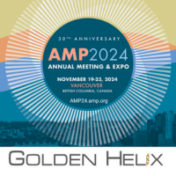NGS Software is Bridging the Gap Between Discovery and Practical Application Researchers, clinicians, and scientists need cutting-edge solutions to better understand the complexities of human genetics. By delivering high-quality analysis tools and advancing the interpretation of genomic data, Golden Helix bridges the gap between discovery and practical application. Our NGS technologies play a critical role in accelerating genetic insights, supporting… Read more »
Thank you to everyone who joined our recent webcast, “Powering Genomic Workflows with Upgraded Catalogs in VSWarehouse and VarSeq 3,” presented by Gabe Rudy on April 23rd, 2025. We appreciate the engagement and interest in the latest advancements to our platform. For those who missed it or need a recap, the session focused on the pivotal role Catalogs play as… Read more »
In the rapidly evolving field of next-generation sequencing (NGS) and precision medicine, data sovereignty has emerged as a critical concern for bioinformatic operations. Healthcare organizations, molecular diagnostic laboratories, and government-funded genome centers worldwide increasingly recognize that maintaining complete control over high-dimensional genomic data isn’t merely about regulatory compliance—it’s fundamentally about scientific autonomy, institutional independence, and long-term data stewardship within a… Read more »
Creating and managing sample manifest files in VarSeq has traditionally been a time-consuming process that demands precision and attention to detail. The upcoming VSWarehouse 3 release will feature the ability to use catalogs to save and load sample fields in VarSeq projects. Not only will this allow for easy population of sample fields in VarSeq, but it also has the… Read more »
Join Golden Helix at ACMG 2025 for Exclusive Demos and Innovations Explore Our Latest Genomic Tools at Booth #722 Golden Helix is excited to announce our participation in the 2025 ACMG Annual Clinical Genetics Meeting from March 19 – 21 in Los Angeles, California. This premier event gathers professionals from the medical genetics community worldwide for four days of education,… Read more »
Advancements in genomic analysis tools have significantly enhanced the identification and characterization of genetic variants associated with complex diseases. VarSeq, our flagship powerful variant annotation and filtration software, plays a crucial role in streamlining whole-exome sequencing (WES) data analysis, enabling researchers to detect pathogenic mutations efficiently. By utilizing VarSeq’s comprehensive annotation capabilities, researchers were able to filter and prioritize variants,… Read more »
At Golden Helix, we’re proud to see how VarSeq is transforming the landscape of genetic research and clinical diagnostics. From variant annotation and filtering to in-depth visualization, VarSeq’s powerful suite of tools helps researchers uncover critical genetic insights with confidence and efficiency. In this blog post, we’re excited to showcase recent publications where VarSeq played a pivotal role in identifying… Read more »
Golden Helix customers are at the forefront of genetic research, using VarSeq to tackle some of the most challenging questions in genomics. From identifying novel variants to uncovering the genetic basis of rare diseases, their work showcases the power of VarSeq in real-world applications. In this blog, we’re highlighting three recent publications that demonstrate how customers are using VarSeq to… Read more »
Golden Helix is excited to announce our attendance at AMP 2024 in Vancouver, British Columbia, from November 21 to 23. Visit booth #1511 to discover how our latest advancements in cancer capabilities, automation, and clinical diagnostics can transform your genomic workflows and precision medicine applications. Live Demos: Experience the Latest Innovations Stop by our booth to see Golden Helix solutions… Read more »
Publicly available datasets play a crucial role in research and offer resources for validation and benchmarking of workflows. In this blog, I would like to point out and briefly discuss several notable, publicly available sources of NGS sequencing data. Each of these sources provides validated datasets that are invaluable for laboratories and institutions processing NGS samples. EPI2ME is an advanced… Read more »
Guess what, Golden Helix users and interested parties? We will be front and center at the ASHG 2024 Annual Meeting in Denver, Colorado, from November 6-8—and we’ve got a ton to share with you. If you’re attending, make sure you swing by booth #959 because we’re bringing some great new information on our latest updates that are going to take… Read more »
I am pleased to announce that VarSeq 2.6.2 is now available! VarSeq 2.6.2 comes jammed-packed with new features and capabilities to advance your NGS analysis workflows. In this blog, I will describe the major changes to the VSPGx workflow, which were the main focus of the release, and I will also talk about other exciting features and new algorithms that… Read more »
Compound heterozygosity describes the relationship between two alternate alleles when they are located within the same gene but at different loci within that gene. Compound heterozygosity is particularly relevant in a recessive disorder when the presence of these alleles in combination confers an increased risk of disease, similar to a traditional homozygous recessive combination of alleles. The detection of compound… Read more »
Exome and genome sequencing have advanced genetic research, but data analysis remains complex. VarSeq simplifies this by helping researchers identify key genetic changes in rare diseases and cancer, improving screening and diagnosis. Here are recent customer publications that highlight VarSeq usage. Expanded carrier screening for inherited genetic disease using exome and genome sequencing The goal of this study was to… Read more »
Thank you to all our audience members who attended our recent webcast, Combined Impact: New Tools to Assess Complex and Compound Heterozygous Variants with VarSeq. If you would like to view the webcast, follow the link above! As the title suggests, this webcast was all about breaking down the new variant analysis tools in the upcoming VarSeq 2.6.2 release and… Read more »
The following customer publications showcase the ability of VarSeq. Each study highlights how VarSeq simplifies variant annotation, filtering, and interpretation, supporting efficient NGS workflows in both clinical and research settings. Rare host variants in ciliary expressed genes contribute to COVID-19 severity in Bulgarian patients Severe acute respiratory syndrome coronavirus-2 (SARS-CoV-2) causes coronavirus disease 2019 (COVID-19), a pneumonia with extremely heterogeneous… Read more »
Our webcast on Integrating Long and Short Read Sequencing for Comprehensive NGS Analysis was a timely review of a topic. We discussed how users are leveraging both short and long-read sequencing modalities for comprehensive NGS analyses, reviewing the differences between long and short-read sequencing, the benefits and limitations of each modality, and how they complement each other. The theme was how… Read more »
This month, we saw overwhelming customer publications with great use cases of VarSeq. Explore the publications below of our amazing customers continuing to pioneer precision medicine. The polygenic implication of clopidogrel responsiveness: Insights from platelet reactivity analysis and next-generation sequencing Clopidogrel is widely used worldwide as an antiplatelet therapy in patients with acute coronary disease. Genetic factors influence interindividual variability… Read more »
The PGx Variant Detection and Recommendations algorithm is the driving force behind the pharmacogenomic analysis capabilities provided by VSPGx in VarSeq. This algorithm is used to identify pharmacogenomic diplotypes and annotate them against drug recommendations. In this blog post, we outline the steps involved in the process and explain the annotation tracks utilized by the algorithm at each stage of… Read more »
In the last year, we have seen a surge in customers moving to whole genome sequencing. Not only does whole genome sequencing provide unparalleled gene coverage compared to whole exome, but depending on the kind of sequencing, you may expect to see additional file types as well. For example, our partners at PacBio will provide an additional VCF containing copy… Read more »

















